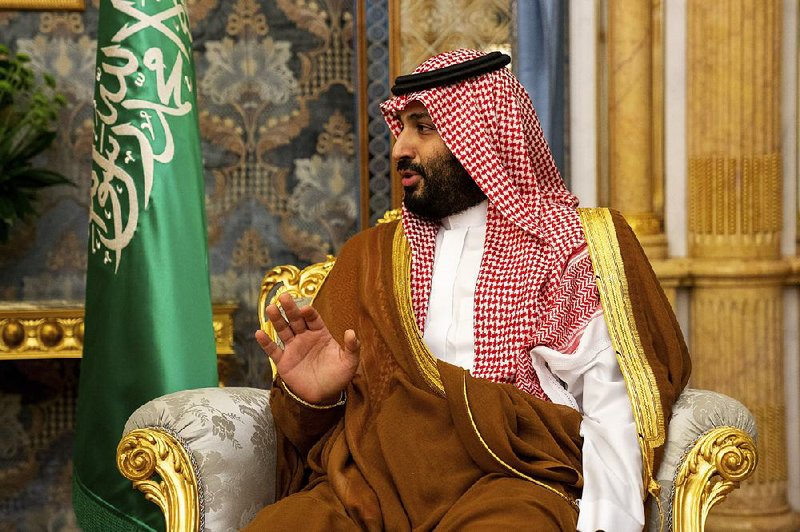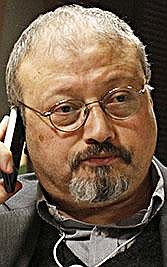GENEVA -- An attempt by Saudi Arabia to halt an investigation into human-rights abuses in Yemen went down to defeat on Thursday as news broke that the kingdom's crown prince said in an upcoming documentary that he bears "all the responsibility" for the killing of the writer Jamal Khashoggi, but denied prior knowledge of the plot.
The two developments showed that despite backing from the United States under President Donald Trump and Saudi attempts to build international support in an escalating conflict with Iran, the kingdom's human-rights record -- and, in particular, the conduct of its unofficial ruler, Crown Prince Mohammed bin Salman -- remains under harsh scrutiny on multiple fronts.
A group of experts, assigned by the United Nations Human Rights Council, has documented atrocities committed by both sides in Yemen's civil war, in particular the shattering impact on civilians of airstrikes and other abuses by the Saudi-led coalition fighting the Houthi rebels. The investigators, barred from entering Yemen, have interviewed hundreds of victims and witnesses, and examined an array of other evidence.
Saudi Arabia sought to cut short the investigation, but on Thursday the nations on the Human Rights Council, meeting in Geneva, voted 22-12 to reject the Saudi effort, with 13 other countries not voting.
That setback came after the release of a preview of a Frontline documentary that addresses the 2018 killing and dismemberment of Khashoggi at a time when Saudi Arabia hopes memories of the case, and the outcry it provoked, are fading.
[Video not showing up above? Click here to watch » https://www.youtube.com/watch?v=jNIysBbhSYA]
Khashoggi, a prominent Saudi writer who had criticized Crown Prince Mohammed in opinion articles in The Washington Post, was killed inside the Saudi consulate in Istanbul nearly a year ago, shocking the world and damaging the reputation of the crown prince and his efforts to diversify the Saudi economy away from oil.
It is unclear whether the comments by Crown Prince Mohammed, 34, made in December, will alter the widespread belief that he authorized the assassination of Khashoggi. A CIA assessment found that the crown prince, a son of the Saudi king, had likely ordered the killing -- a conclusion shared by many officials of the United States and other countries.
The crown prince, who would like to be seen in the West as a liberalizer and modernizer, is also the architect of the 4½-year war effort in Yemen by Saudi Arabia and the United Arab Emirates that has contributed to creating what the United Nations has called the world's worst man-made humanitarian crisis.
"It happened under my watch," Crown Prince Mohammed told Martin Smith, a reporter for Frontline, according to a trailer released on Tuesday for a documentary to be broadcast Wednesday. "I get all the responsibility. Because it happened under my watch."
Turkish and Saudi officials have described a complex operation that led to the killing of Khashoggi, who had fled waves of arrests of clerics and activists in Saudi Arabia as Crown Prince Mohammed consolidated his power, to settle near Washington.
On Oct. 2 last year, Khashoggi entered the Saudi consulate in Istanbul for an appointment to obtain a document he needed to marry his Turkish fiancee. He was met by 15 Saudi agents who had flown in hours earlier on government jets. According to Turkish officials, one was a specialist in autopsies, who brought a bone saw.
They killed and dismembered him, and disposed of his body, which has yet to be found.
Turkish officials and a United Nations investigator who examined the killing have accused the Saudis of an elaborate cover-up involving a body double and teams of technical experts who cleansed the crime scene before the Turks were given access.
When asked how such an operation could take place without his knowledge, the prince said he could not stay abreast of every act in his country or government.
"We have 20 million people," he said, according to the trailer. "We have 3 million government employees."
The Saudis have put 11 suspects in the killing on trial and prosecutors are seeking the death penalty against five of them. But the court proceedings have been shrouded in secrecy. The Saudis have not identified any of the suspects by name, and diplomats who have attended court sessions have been sworn to silence.
In a report on the killing released in June, Agnes Callamard, the special reporter on extrajudicial executions for the U.N. human-rights agency, said the Saudi trial had been "clouded in secrecy and lacking in due process."
The experts investigating Yemen have identified people they linked to international crimes there. It is not clear whether Crown Prince Mohammed's name is on that list.
A Section on 09/27/2019

